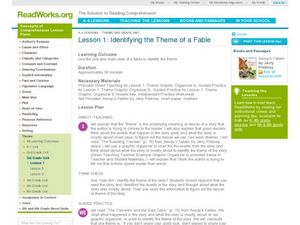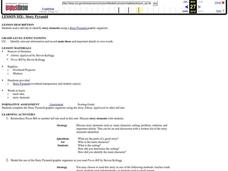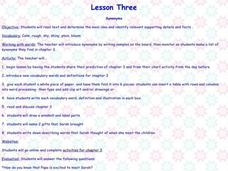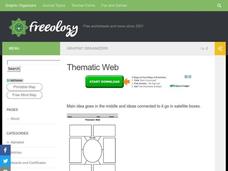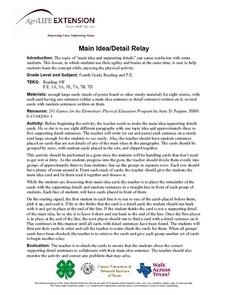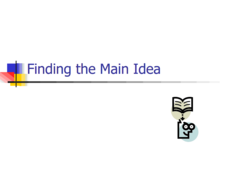Curated OER
Identifying Theme of a Fable
Third graders understand how to find the theme of a fable. In this theme lesson, 3rd graders use graphic organizers to record the events of a fable. Students use that information to determine the lesson of the story. Students do a guided...
Curated OER
The Apple Pie Tree
Students read The Apple Pie Tree and discuss the story and talk about what was living in the tree. In this life comprehension lesson, students write the main idea of the book in a few sentences.
Curated OER
Story Pyramid
Learners read tall tales to identify story elements. In this story elements lesson, students read about Johnny Appleseed and Pecos Bill and use graphic organizers to record information. Learners read in small groups, read independently...
Curated OER
Story Elements
Third graders identify story elements. In this story elements instructional activity, 3rd graders look at main idea, characters, point of view, theme and setting. They create a five paneled comic strip from a book.
Curated OER
Henry and Mudge: comprehension skills
In this comprehension skills activity, students read the book Henry and Mudge and complete comprehension activities. Students complete activities such as inferences, drawing conclusions, character traits, and main idea and details.
Curated OER
Dogs: Comprehension Strategies
In this comprehension strategies worksheet, students read the story Dogs and then complete comprehension strategies for the story. Students complete activities on cause and effect, main idea and details, inferences, details, and drawing...
Curated OER
Synonyms
Students examine synonyms from their reading. In this synonyms lesson, students use vocabulary from their reading to create a chart and illustrate the words. Students complete online activities from the story.
Curated OER
Muggie Maggie - Lesson 6
Third graders read chapter 6 of Beverly Cleary's, Muggie Maggie, and complete associated activities. In this Muggie Maggie activity, 3rd graders complete vocabulary work. They examine punctuation marks used in the chapter, and make a...
Curated OER
The Chocolate Touch
Students read a book. In this story elements lesson, students share their favorite food, predict what the story will be about and discuss how they would feel if they got to eat their favorite food everyday. Students read the book The...
Curated OER
Freckle Juice
Students complete activities with the book Freckle Juice by Judy Blume. In this literature lesson, students read chapter one and brainstorm adjectives for the four main characters. They make a page of vocabulary words and definitions.
Curated OER
Identifying Main Idea and Supporting Details - The Stonecutter's Wish
Students identify details that support the theme of a story. In this main idea or theme lesson, students view a video of "The Stonecutter's Wish." Students are given a graphic organizer to use as they discuss the main idea of the...
Curated OER
What's the Big Idea: Exercise 4
In this main idea worksheet, students write the common subject heading for 12 groups of words. Students read the three words in each group and write a title or main idea heading. Students add another example that could be included in...
Curated OER
Thematic Web
In this thematic web worksheet, students complete a graphic organizer with the main idea of the story in the center. Students then identify supporting details and write them in the boxes around the center.
Curated OER
Science and Society: Synthetic Elements
For this synthetic elements worksheet, students read a selection, "Maya Lin's Civil Rights Memorial," then decipher the main ideas. Students are asked to support their main ideas with notes and phrases that prove their understanding of...
Curated OER
Finding Main Ideas
In this reading worksheet, young scholars learn to identify the main idea in a newspaper article. Students read an article about police dogs and answer 2 questions. Then young scholars choose 3 newspaper articles on their own and...
Curated OER
Sum It Up !!
Students practice various comprehension strategies to generate the main idea of the text. They encounter unfamiliar concepts and new vocabulary in their quest of the main idea in "Watson's Goes to Burmingham." The Five W's (What, Where,...
Curated OER
Let's Get the Facts!
Students observe and demonstrate the process of summarization. They discuss the three steps of summarization, then silently read a National Geographic Kids News article. As a class they complete a semantic map of the article, and write...
Curated OER
To Sum it all Up...
Students observe and demonstrate the process of summarizing text. They read and discuss the steps to summarize text, then in small groups read and summarize an article about frogs from "National Geographic" online. Independently they...
Curated OER
Some Simple Rules to Sum it Up!
Students observe and demonstrate three steps to summarize text. They read and discuss the three steps to summarizing, then silently read an article about dugongs from "National Geographic Kids" magazine. Students demonstrate the three...
Curated OER
Scrapbook of Evidence
Students read three different genres of fiction. They create a story map and brainstorm possible collage inclusions. Each student prepares a minimum of two scrapbook page entries for each text or passage. Students write beside each...
Curated OER
Number the Stars by Lois Lowry
Fifth graders close their eyes and pretend they live in Denmark during the 1940's. They discuss what they "see." Students create a story chart for the book "Number the Stars," by Lois Lowry.
Curated OER
Main Idea/Detail Relay
Fourth graders discuss the difference between main ideas and supporting details. They use large placement cards made by the teacher with main idea and supporting detail statements on them to practice.
Curated OER
Finding the Main Idea
Being able to identify the main idea in a text is an essential comprehension skill. After the term is defined, viewers examine a series of paragraphs and are asked to identify the main idea and the supporting details.
Curated OER
When the Fly Flew In
Explore visual and verbal recall and sequencing with your youngsters. Start by reading a story and completing a worksheet after listening to the story. They work to identify the main idea and supporting details. The worksheet is included...


